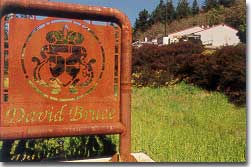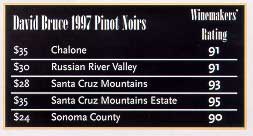



 avid
Bruce was a teetotaling Stanford graduate when he first learned about Pinot Nior
from legendary winemaker Martin Ray. avid
Bruce was a teetotaling Stanford graduate when he first learned about Pinot Nior
from legendary winemaker Martin Ray. |  | In the 1980s, he was determined to get to the bottom of what he calls "the greatest of the four great grapes of this world-Pinot Nior." His wines found their footing and became steady and reliable performers. |
Bruce went on to become one of the first post-Prohibition winemakers in the Santa Cruz mountains to advocate traditional French winemaking practices-even preceding such pioneers as Dick Graff at Chalone and Dave Bennion at Ridge. That and his dogged commitment to perfection later made for an epiphany, and, since then, Bruce's Pinot Noirs have become benchmarks in California. It all started when he founded his winery in Santa Cruz Mountains in 1964 and began experimenting. He did strange things like making the powerful red Zinfandel grape into white wine. He toyed with Petite Sirah, thinking it was the famous Syrah of Hermitage. Gewurtztraminer and Grenache came under his gaze. He worked with pretty much every grape that was available to him. The 1970s were exploratory, as Bruce made wines from eleven different California counties. It was during this phase of his apprenticeship that he zeroed in on the remarkable differences among varietals. | But it wasn't until the 1990s that quality skyrocketed. From 1994 on, none of his Pinot Niors have scored less that 90 on the GV500 scale. They've scored similarly high with winemakers although the national wine critics are just now beginning to pick up on this explosion of quality. Bruce hasn't achieved this high quality by making tiny lots, either. He currently has six Pinot Nior labels, with an average production of 5,200 cases for each one. Ever marching to his own drummer, Bruce doesn't rely on any one region, appellation, or vineyard for this performance. He cherry-picks Pinot Nior from the best regions of the state and turns the grapes into stunning wines. Asked the secret of his recent success with the traditionally difficult Pinot Nior grape, Bruce says, "Loads and loads of mistakes. Years ago we made wine by the seat of the pants, but eventually we learned from our mistakes and graduated to understanding the delicate personality of the Pinot Nior grape. We learned a lot about wine chemistry and the best region to grow Pinot." |
 |  |
| David Bruce Winery is quickly becoming one of the premier Pinot Nior preoducers in California-- crafting wines not only of very high quality from several appellations, but with good availability as well. Above: The winery was founded in 1964, but only last year was the super-modern facility built. Above Right: The winemaking team: From left, Ken Foster, productiion manager; David Bruce winemaker; Tony Creig, enologist. Lower Right: Bruce's 1997 Pinot Noir line-up scored high with the regional winemakers. |  |
He says that any winemaker worth his or her salt wants to make great Pinot Nior. "If you want to learn how to make wine, start with Pinot. If you can make good Pinot, you can make good anything."
And what, precisely, does he do with all that cherry-picked fruit to preserve its quality and get in into the bottle? "I like very warm fermentations," he says. "They give more complexity. Cooler fermentations give a simpler, Beaujolais quality."
And? "Well, I do a lot of foot crushing," he says. Foot crushing enough grapes to make 40,000 cases of wine? "When I first started making wine, I foot crushed everything," he says.
"It
was 3 A.M. and I was naked in the vat, stomping away, when I suddenly realized
what I was doing. After all isn't the winemaker's job to extract just the right
amounts of color and flavoring elements out of the grapes skins, stems, or seeds,
therefore leaving no bitterness. And what is the most important aspect of a great
Burgundy or Pinot Nior? It's that wonderful velvet texture."
"The secret
of great wine is to get every drop of extract from the grapes, but not a drop
too much. It takes four or five days to foot crush all the grapes; and in that
time you get some carbonic maceration, and the fruit that is crushed soaks in
the juice before the fermentation gets going. All this adds complexity."
"I just about killed my crew in 1997," he admits. "We foot crushed every drop
of Pinot Nior that year. So now we have two rotary tanks-the closest thing to
foot crushing there is. The weight of the grapes crushes them. But we still use
foot crushing for our finest wines."
Early in his winemaking career, David
Bruce swore that he would make the finest Pinot Nior ever made. Has he done it?
That's for you to decide. Bruce says that's his commitment, and that's the drum
to which he will continue to march.
David Bruce Winery is located in the Santa Cruz Mountains near Los Gatos, California.
(The heart of Silicon Valley - home of AMD, Intel,
National Semiconductor, 3COM, Yahoo, among many others)
Voice: 800-727-3844 Fax: 800-727-3851
Kitm@americanleasing.com
